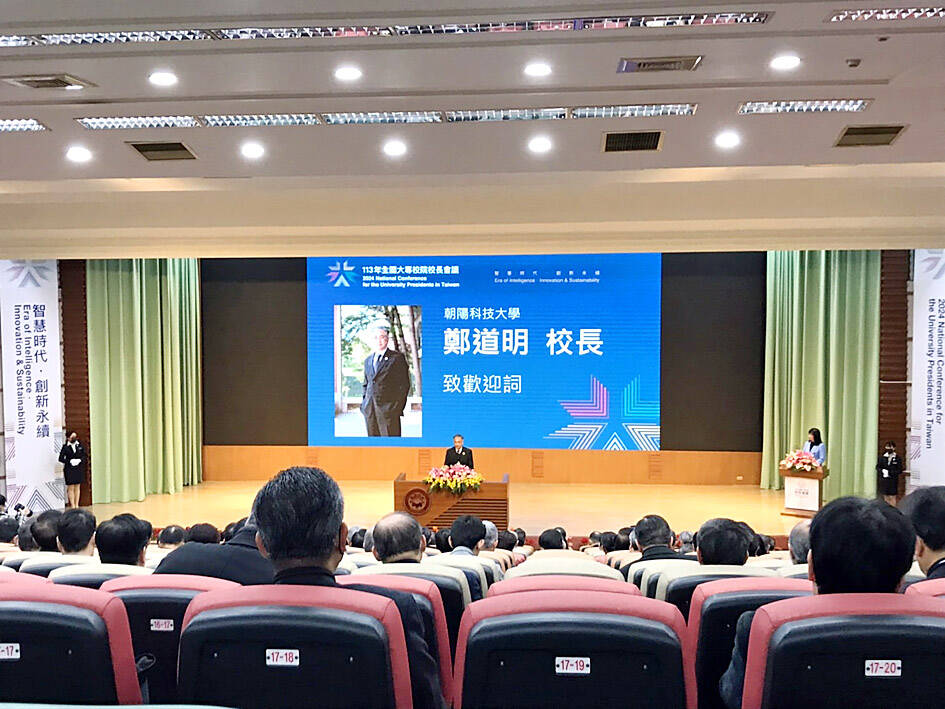A total of 116 academia-industry collaboration programs that could enroll up to 2,120 international students are to be added across Taiwan, with scholarship opportunities and visa assistance available, the Ministry of Education said yesterday.
Department of Technological and Vocational Education Director Yang Yu-hui (楊玉惠) gave a briefing on the ministry’s policy at the annual National Conference for University Presidents.
Universities would add 58 new programs, as would vocational schools, with 93 to be in science, technology, engineering and mathematics, while 15 are to focus on semiconductors and eight are to be in finance, Yang said.

Photo: Yang Mien-chieh, Taipei Times
In addition, recruitment bases are to be set up in the Philippines, Vietnam and Indonesia by the end of this month, she said.
Taiwan is expected to lose its demographic dividend by 2028, so to achieve an average of 3 percent annual population growth, the nation needs to attract 400,000 immigrants by 2030, she said.
International students in Taiwan are more familiar with the nation and have benefited from its education resources, she said, adding that they could be seen as potential economic migrants and efforts to retain them should be prioritized.
Such efforts include encouraging schools to establish international student divisions, providing basic Mandarin courses, expanding on existing academia-industry collaboration programs and relaxing regulations for international students working in Taiwan, she said.
The ministry is encouraging schools to collaborate with businesses to establish new programs, she said.
The Executive Yuan’s National Development Fund (國發基金) is to provide scholarship funds, while companies are expected to provide subsidies to help with living expenses, she said.
The National Development Council is to mull policies to allow international students to count their time studying in Taiwan toward total duration of stay should they wish to apply for an Alien Permanent Resident Certificate.
International students who receive scholarships would have additional “points” and they would no longer have to file for a work visa under the points system, she said, adding that their applications would be processed directly by the Ministry of Labor.
The points system, or New Scoring Criteria, is implemented by the Ministry of Labor to gauge whether an individual is eligible to work in Taiwan. International students must obtain 70 points out of 190 to be eligible for a work visa.

CHIPMAKING INVESTMENT: J.W. Kuo told legislators that Department of Investment Review approval would be needed were Washington to seek a TSMC board seat Minister of Economic Affairs J.W. Kuo (郭智輝) yesterday said he received information about a possible US government investment in Taiwan Semiconductor Manufacturing Co (TSMC, 台積電) and an assessment of the possible effect on the firm requires further discussion. If the US were to invest in TSMC, the plan would need to be reviewed by the Department of Investment Review, Kuo told reporters ahead of a hearing of the legislature’s Economics Committee. Kuo’s remarks came after US Secretary of Commerce Howard Lutnick on Tuesday said that the US government is looking into the federal government taking equity stakes in computer chip manufacturers that

POWER PLANT POLL: The TPP said the number of ‘yes’ votes showed that the energy policy should be corrected, and the KMT said the result was a win for the people’s voice The government does not rule out advanced nuclear energy generation if it meets the government’s three prerequisites, President William Lai (賴清德) said last night after the number of votes in favor of restarting a nuclear power plant outnumbered the “no” votes in a referendum yesterday. The referendum failed to pass, despite getting more “yes” votes, as the Referendum Act (公民投票法) states that the vote would only pass if the votes in favor account for more than one-fourth of the total number of eligible voters and outnumber the opposing votes. Yesterday’s referendum question was: “Do you agree that the Ma-anshan Nuclear Power Plant

Chinese Nationalist Party (KMT) lawmakers have declared they survived recall votes to remove them from office today, although official results are still pending as the vote counting continues. Although final tallies from the Central Election Commission (CEC) are still pending, preliminary results indicate that the recall campaigns against all seven KMT lawmakers have fallen short. As of 6:10 pm, Taichung Legislators Yen Kuan-heng (顏寬恒) and Yang Chiung-ying (楊瓊瓔), Hsinchu County Legislator Lin Szu-ming (林思銘), Nantou County Legislator Ma Wen-chun (馬文君) and New Taipei City Legislator Lo Ming-tsai (羅明才) had all announced they

Nvidia Corp CEO Jensen Huang (黃仁勳) yesterday visited Taiwan Semiconductor Manufacturing Co (TSMC, 台積電), as the chipmaker prepares for volume production of Nvidia’s next-generation artificial intelligence (AI) chips. It was Huang’s third trip to Taiwan this year, indicating that Nvidia’s supply chain is deeply connected to Taiwan. Its partners also include packager Siliconware Precision Industries Co (矽品精密) and server makers Hon Hai Precision Industry Co (鴻海精密) and Quanta Computer Inc (廣達). “My main purpose is to visit TSMC,” Huang said yesterday. “As you know, we have next-generation architecture called Rubin. Rubin is very advanced. We have now taped out six brand new